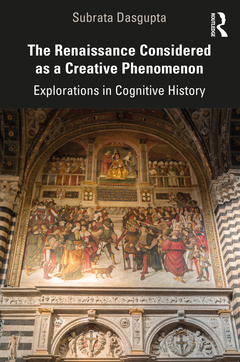The Renaissance Considered as a Creative Phenomenon Explorations in Cognitive History
Auteur : Dasgupta Subrata

By using the fresh investigative language of cognitive history, a symbiosis of the methods of cognitive science and historical inquiry, this book departs from almost all previous approaches to Renaissance studies.
The Renaissance has attracted the attention of distinguished scholars from many different vantage points ? political, social, economic, intellectual, and cultural. In this volume, Subrata Dasgupta sheds an alternative light on the Renaissance by considering it as a creative phenomenon. To be creative is to make history by producing material and/or abstract artifacts that are both new and consequential; to be creative also entails drawing on history and on the culture of the time. Most significantly, the creative process occurs in individual minds: it is a cognitive process of a very special kind. Beginning with a ?prehistory? set in classical Greece and medieval Islam, this book explores a variety of inventions and discoveries through the 14th?16th centuries, mainly in Italy, in humanities, painting, architecture, craft technology, anatomy, natural science, and engineering.
This book will be of interest not only to Renaissance scholars but also to students interested in Renaissance history and the nature of the creative tradition.
Prologue 1. The language of cognitive history 2. Renaissance creativity: a cognitive prehistory 3. The cognitive style of an early humanist 4. A shared memory revolution 5. Art-of-painting as a Renaissance artifact 6 .Utilitarianism of an unforgiving kind 7. Refute-and-replace: rejecting antiquity 8. ‘Galileo modern’ as a cognitive style 9. Epilogue Glossary of terms
Subrata Dasgupta is Professor Emeritus in the School of Computing & Informatics at the University of Louisiana at Lafayette, USA, where from 1993 to 2018 he held the Computer Science Trust Fund Eminent Scholar Chair and from 1999 to 2013 served as director of the Institute of Cognitive Science. He has authored numerous works on the cognitive, historical, and computational aspects of creative phenomena, especially in science, technology, intellectual movements, and art including, most recently, A Cognitive Historical Approach to Creativity (Routledge, 2019).
Date de parution : 12-2021
15.6x23.4 cm
Date de parution : 12-2021
15.6x23.4 cm
Thème de The Renaissance Considered as a Creative Phenomenon :
Mots-clés :
Knowledge Space; Creative Encounters; fourteenth century; Abstract Artifact; sixteenth century; Creative Phenomena; cognitive process; Renaissance Creativity; creativity; Proactive Preparation; Cognitive history; Peer Consumers; Renaissance; Sofonisba Anguissola; Intellectual Artifacts; Uniform Circular Motion; Creative Movement; De Fabrica; Studia Humanitatis; Ptolemaic Paradigm; Islamic Consumers; Cosimo II; Pro Archia; Utilitarian Artifacts; Young Man; De Revolutionibus; Epistemic Complexity; Stillman Drake; Islamic Astronomers; Creative Tradition



